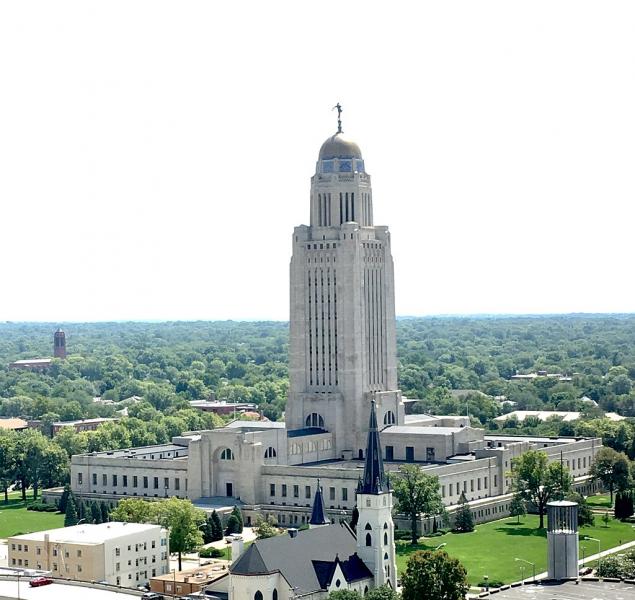
A recent study by wallet hub shows that Nebraska’s overall property tax burden is 8th highest in the nation. Governor Pete Ricketts of Nebraska recently spoke out about putting together a plan to end this vicious cycle of high property taxes in his state. For years Nebraska’s state government has sought ways to provide tax relief for their residents. However, local governments continue to raise property taxes year after year. Nebraska’s property tax collections per Capita are 340 dollars higher than the national average. Politicians have promised to address the property tax issue for years in Nebraska without delivering. However, many are hopeful about the Governor’s new plan.
Governor Pete Ricketts has proposed a budget including a 1.5 percent per year limit on state spending and a 3 percent growth limit for local governments’ spending. The Governor believes these spending limits will be the reform necessary to implement long-lasting change in the state’s Tax system. Ricketts argues that spending limits will influence these government entities to curtail their size and scope, which will slow down ever-rising property taxes. Governor Ricketts detailed the problem facing his state in a recent address:
“We have to make sure that the state tax relief doesn’t simply result in new spending by local political subdivisions like cities, counties, community colleges, natural resources districts, and schools. Here’s how the process has worked in the past: Local property taxes go up faster than income and inflation. Nebraskans pay higher property taxes. The state delivers property tax relief. Local property tax bills continue to go up. Taxpayers see no real relief because the relief from the state is needed to cover the higher property tax bills they get from political subdivisions.”
Governor Ricketts also plans on expanding property tax relief programs to make sure that Nebraska citizens have money in their wallets immediately, especially during the hardships residents have endured under COVID. For years Nebraska has used Property tax credits to offset the rapidly inflating property taxes in the state. Despite the program’s good intentions, it is used as a tool to kick the can down the road on real reform. However, more tax credits in conjunction with severe budget limitations could be the structural change Nebraska needs. Nebraska residents will be pleased to know that the property tax credit fund will continue to expand, ensuring immediate tax relief. At the same time, residents wait for the Governor’s structural changes to influence the course of the state’s budgetary future. Nebraska has an excellent opportunity right now to set the course for deep-rooted changes. Nebraska has a budget surplus.
Nebraska has fared better than expected during the COVID lockdown, and Governor Ricketts is using healthy tax revenues as an opportunity to curtail government spending and address long-standing issues the state has suffered from for years. Nebraska’s property tax burden has hurt its economic rankings for longer than many imagine, slowing down the state’s growth and competitiveness. Nebraska Has ranked 36th in economic outlook according to ALEC’s most recent study, primarily due to its high tax burden. Nebraska has been long overdue to address this perennial problem; structural reform is needed to address these rising taxes. Despite the challenge, many are optimistic the Governor’s recent plan is a step in the right direction.
Senator Lou Ann Linehan, Chairwoman of the legislature’s revenue committee, has been an outspoken critique for tax modernization in Nebraska. In a recent zoom meeting, reports indicate the senator was enthusiastic about attacking Nebraska’s property tax quagmire head-on “Nebraska is living with a 1967 tax code and needs to consider proposals to broaden its tax base and lower its tax rates. “We have a governor with experience, and we’re going to lose 12 seasoned legislators” after the 2022 election when they will be term-limited out of office, Linehan noted. “The time frame is now,” she said, and the state needs to go big in terms of tax reform even though “big is hard.”
Nebraska’s problem with property taxes is hurting its business and competitiveness rankings and slowing down the state’s opportunity for sustained economic growth. Governor Pete Ricketts proposal to put caps on government spending as a way to slow down taxes is a plan with merit. However, it’s going to take real follow through to prove this idea is a solution and not just political theater. Nebraskans have been promised for years that something will be done about property taxes in their state. However, all they have received so far are quick fixes and short-term solutions. Providing tax credits alone has not been sufficient to offset rising local property taxes throughout the state fully. Budget limitations and fiscal caps on governing bodies at the state and local level might be the solution that Nebraska needs.

